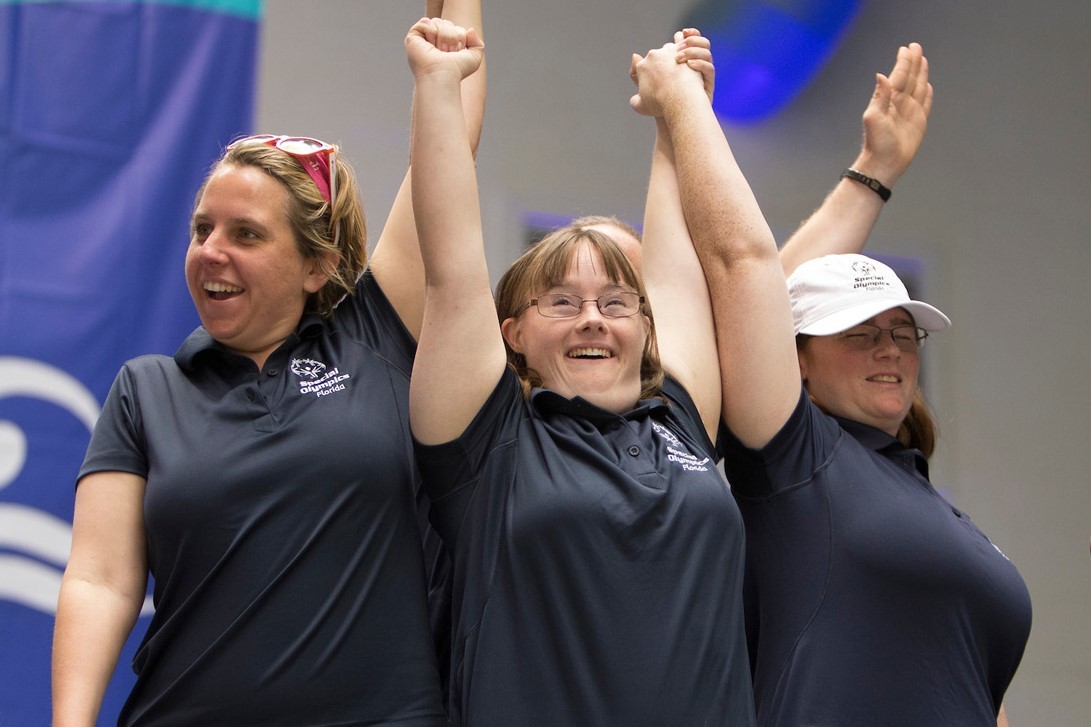- December 15, 2024
-
-
Loading

Loading

Throughout Alexandra Cooper’s time in Special Olympics, she has seen and done quite a lot.
The medals she has won and the experiences she has enjoyed have provided her with a lifetime of memories and moments. Many times those moments are expected, but every now and then there’s one that seemingly comes out of nowhere.
That was the case this month when the longtime Special Olympian was named the Orange County Special Olympics Athlete of the Year during the Night With Our Stars event at the Rosen Plaza Hotel.
“I was shocked,” said Cooper, 27. “My team voted for me, and my coaches too.”
“We had no idea,” said Karen Endre, Alexandra’s mom. “That was the cool part — that people that have interacted with her and been around her for a long time just decided that this year she was the one who was their inspiration, which was very cool.”

The latest notch in Cooper’s belt is well earned for the Dr. Phillips resident and Olympia High alum, especially when you look at the last year she has had in the pool as a Special Olympian.
The peak of that success came at the 2018 Special Olympics USA Games that were held on the campus of the University of Washington in Seattle.
It was there that Cooper had that moment as an athlete that transcends everything she has ever experienced. And it all started with stepping out onto the field alongside Special Olympians from all over the country at Husky Stadium in front of 50,000 fans who were cheering them on.
“It was amazing, and fun with my team,” Cooper said. “I really liked the opening ceremonies — it was pretty cool.”
And it was a moment that wasn’t lost on Cooper’s parents, who were in the stands there amongst the crowd.
“I was super proud — it’s something that, when you have a child with a disability, you don’t think that is ever going to happen,” Endre said. “To see that is amazing.”
Cooper would take that energy and put it to good use, as she grabbed a bronze medal in the 25m backstroke, and helped her team take home gold in the 4x25m freestyle team relay.
Fast forward to around two weeks ago, and Cooper was once again standing on the winners’ podium — this time at the State Summer Games held at the ESPN Wide World of Sports Complex.
Though her major achievements and passions lie in swimming, Cooper won in a couple of different fields at the State Summer Games — taking home gold in the shot put and bronze in the 400m walk.
Crazily enough those medals, and the medals she won at the U.S. games, are a mere drop in the bucket when it comes to all of her accomplishments since joining the Special Olympics when she was 9 years old. Since then, a lot has changed for Cooper — both in and outside of the pool.
“That was the cool part — that people that have interacted with her and been around her for a long time just decided that this year she was the one who was their inspiration, which was very cool.”
— Karen Endre, Alexandra’s mom
“For me I was crying the first time she competed — I couldn’t believe she made it to the end of the pool,” Endre said. “It was the first time I’ve really seen her be truly successful at something. I mean, she really competed.”
And over the years Cooper has progressed to heights that no one knew was possible, thanks in large part to Apryle Nickson, who trains Cooper and her best friend Nicole Hogan, another Special Olympian.
Once a week Cooper works with Nickson in the pool, and it’s hard work, Cooper said.
“In the 25m relay, she took one breath on the swim,” said Thomas Endre, Cooper’s step-dad. “It was neat to watch… she has trained well.”
But more so than anything, it’s the growth that Cooper’s parents have seen blossom outside of athletics that really shines through.
Through the Special Olympics, Cooper has made tons of friends and has been given the chance to accomplish things that she otherwise might not have been able to do without the help of the organization.
“That’s really the beauty of Special Olympics, because a lot of these kids truly would not achieve these things if it were not for an organization like this,” Karen said. “And with Nick (her brother) being a twin, he was doing things and I’m thinking, ‘She just saw him do this, she is going to do this too,’ and it’s the same way with Special Olympics — you see kids doing things and you go, ‘I can do that.’”